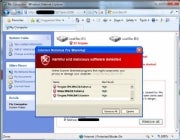MINNEAPOLIS – A replay of the nation's only file-sharing case to go to trial has ended with the same result — a Minnesota woman was found to have violated music copyrights and must pay huge damages to the recording industry.
A federal jury ruled Thursday that Jammie Thomas-Rasset willfully violated the copyrights on 24 songs, and awarded recording companies $1.92 million, or $80,000 per song.
Thomas-Rasset's second trial actually turned out worse for her. When a different federal jury heard her case in 2007, it hit Thomas-Rasset with a $222,000 judgment.
The new trial was ordered after the judge in the case decided he had erred in giving jury instructions.
Thomas-Rasset sat glumly with her chin in hand as she heard the jury's finding of willful infringement, which increased the potential penalty. She raised her eyebrows in surprise when the jury's penalty of $80,000 per song was read.
Outside the courtroom, she called the $1.92 million figure "kind of ridiculous" but expressed resignation over the decision.
"There's no way they're ever going to get that," said Thomas-Rasset, a 32-year-old mother of four from the central Minnesota city of Brainerd. "I'm a mom, limited means, so I'm not going to worry about it now."
Her attorney, Kiwi Camara, said he was surprised by the size of the judgment. He said it suggested that jurors didn't believe Thomas-Rasset's denials of illegal file-sharing, and that they were angry with her.
Camara said he and his client hadn't decided whether to appeal or pursue the Recording Industry Association of America's settlement overtures.
Cara Duckworth, a spokeswoman for the RIAA, said the industry remains willing to settle. She refused to name a figure, but acknowledged Thomas-Rasset had been given the chance to settle for $3,000 to $5,000 earlier in the case.
"Since Day One we have been willing to settle this case and we remain willing to do so," Duckworth said.
In closing arguments earlier Thursday, attorneys for both sides disputed what the evidence showed.
An attorney for the recording industry, Tim Reynolds, said the "greater weight of the evidence" showed that Thomas-Rasset was responsible for the illegal file-sharing that took place on her computer. He urged jurors to hold her accountable to deter others from a practice he said has significantly harmed the people who bring music to everyone.
Defense attorney Joe Sibley said the music companies failed to prove allegations that Thomas-Rasset gave away songs by Gloria Estefan, Sheryl Crow, Green Day, Journey and others.
"Only Jammie Thomas's computer was linked to illegal file-sharing on Kazaa," Sibley said. "They couldn't put a face behind the computer."
Sibley urged jurors not to ruin Thomas-Rasset's life with a debt she could never pay. Under federal law, the jury could have awarded up to $150,000 per song.
U.S. District Judge Michael Davis, who heard the first lawsuit in 2007, ordered up a new trial after deciding he had erred in instructions to the jurors. The first time, he said the companies didn't have to prove anyone downloaded the copyrighted songs she allegedly made available. Davis later concluded the law requires that actual distribution be shown.
His jury instructions this time framed the issues somewhat differently. He didn't explicitly define distribution but said the acts of downloading copyrighted sound recordings or distributing them to other users on peer-to-peer networks like Kazaa, without a license from the owners, are copyright violations.
This case was the only one of more than 30,000 similar lawsuits to make it all the way to trial. The vast majority of people targeted by the music industry had settled for about $3,500 each. The recording industry has said it stopped filing such lawsuits last August and is instead now working with Internet service providers to fight the worst offenders.
In testimony this week, Thomas-Rasset denied she shared any songs. On Wednesday, the self-described "huge music fan" raised the possibility for the first time in the long-running case that her children or ex-husband might have done it. The defense did not provide any evidence, though, that any of them had shared the files.
The recording companies accused Thomas-Rasset of offering 1,700 songs on Kazaa as of February 2005, before the company became a legal music subscription service following a settlement with entertainment companies. For simplicity's sake the music industry tried to prove only 24 infringements.
Reynolds argued Thursday that the evidence clearly pointed to Thomas-Rasset as the person who made the songs available on Kazaa under the screen name "tereastarr." It's the same nickname she acknowledged having used for years for her e-mail and several other computer accounts, including her MySpace page.
Reynolds said the copyright security company MediaSentry traced the files offered by "tereastarr" on Kazaa to Thomas-Rasset's Internet Protocol address — the online equivalent of a street address — and to her modem.
He said MediaSentry downloaded a sample of them from the shared directory on her computer. That's an important point, given Davis' new instructions to jurors.
Although the plaintiffs weren't able to prove that anyone but MediaSentry downloaded songs off her computer because Kazaa kept no such records, Reynolds told the jury it's only logical that many users had downloaded songs offered through her computer because that's what Kazaa was there for.
Sibley argued it would have made no sense for Thomas-Rasset to use the name "tereastarr" to do anything illegal, given that she had used it widely for several years.
He also portrayed the defendant as one of the few people brave enough to stand up to the recording industry, and he warned jurors that they could also find themselves accused on the basis of weak evidence if their computers are ever linked to illegal file-sharing.
"They are going to come at you like they came at 'tereastarr,'" he said.
Steve Marks, executive vice president and general counsel of the Recording Industry Association of America, estimated earlier this week that only a few hundred of the lawsuits remain unresolved and that fewer than 10 defendants were actively fighting them.
The companies that sued Thomas-Rasset are subsidiaries of all four major recording companies, Warner Music Group Corp., Vivendi SA's Universal Music Group, EMI Group PLC and Sony Corp.'s Sony Music Entertainment.
The recording industry has blamed online piracy for declines in music sales, although other factors include the rise of legal music sales online, which emphasize buying individual tracks rather than full albums.




